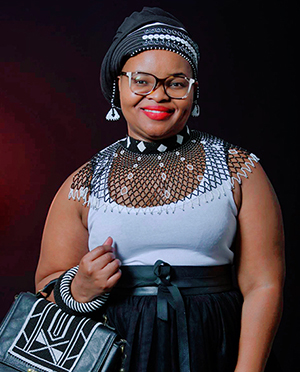College of Human Sciences
Womanism and black theology of liberation
In exploring possible contours of dialogue between Black Theology of Liberation and Womanist Theology, Prof Fundiswa Kobo strives to liberate fragmented black humanity as a whole.
As a womanist, she argues that a black woman is the author of her own liberation. In her work, this black woman is coming out of the dungeons to decentre the West. "My publications expose her dilemma in her quest for liberation from racism and white patriarchy and black patriarchy, what many scholars who inspire me refer to as double, triple or multiple oppressions of a black woman," she says.

Prof Fundiswa Kobo
Yet, like her, Kobo adopts a "hardline pro-black position" in her realisation that her liberation is the liberation of the fragmented black humanity as a whole, and that includes her fellow black men.
"I am inspired by a theological vision that dreams of a comprehensive liberation for women, the African church and the world through the gospel of Jesus Christ."
Kobo, an ordained minister in the Uniting Presbyterian Church in Southern Africa, says her role as a pastor in South African townships has inspired her to be in constant dialogue in the quest for life-affirming theologies and spiritualities that speak to the African continent.
VukaniBantu-TshohangBatho movement
Open-minded and sensitive to cultural differences, Kobo is a researcher and Chair of the VukaniBantu-TshohangBatho (wake up/rise people) movement, a historical project of black liberation whose vision is to invest in spiritual capital for the liberation of Black African people and humanity in general. The movement contributes to Unisa's decolonisation and Africanisation agenda.
"It is the tradition of black consciousness to run projects aimed at restoring the self-reliance and dignity of black humanity," she says. The current project of the movement is looking at the continued importance of doing liberation theologies for decolonial times through conferences and seminars in universities and churches in the townships by focusing on themes of spiritualities of liberation.
The project explores several questions on Black Theology of Liberation, Womanist Theology and African Theology in the 21st century.
It looks, among others, at whether liberation theologies need an epistemological broadening in addition to the content matter of socio-economic-religious aspects. She posits whether it should include a profound critical discourse towards other societal imbalances such as ecology, gender-based violence, human trafficking, disability, marginalisation of sexual minorities, and post- and decolonialism.
Kobo has published in high-impact and accredited journals and contributed to edited books. She is a member of the OASIS Scholarly Books Editorial Board of Theological and Religious Studies and Ecclesial Futures Editorial Board.
She co-edited a book in honour of the mother of African women's Theology, Prof Mercy Amba Oduyoye, and co-edited a special journal collection in honour of the late Prof Vuyani Vellem, a distinguished scholar of Black Theology of Liberation.
* By Mpho Moloele, PR and Communications, Department of Research, Innovation and Commercialisation
Publish date: 2024/02/29

 Unisa co-hosts G20 community outreach in the Eastern Cape
Unisa co-hosts G20 community outreach in the Eastern Cape
 Unisans gain membership of prestigious science academies
Unisans gain membership of prestigious science academies
 Advocating for disability transformation through servant leadership
Advocating for disability transformation through servant leadership
 Unisa Press continues to illuminate the publishing space
Unisa Press continues to illuminate the publishing space